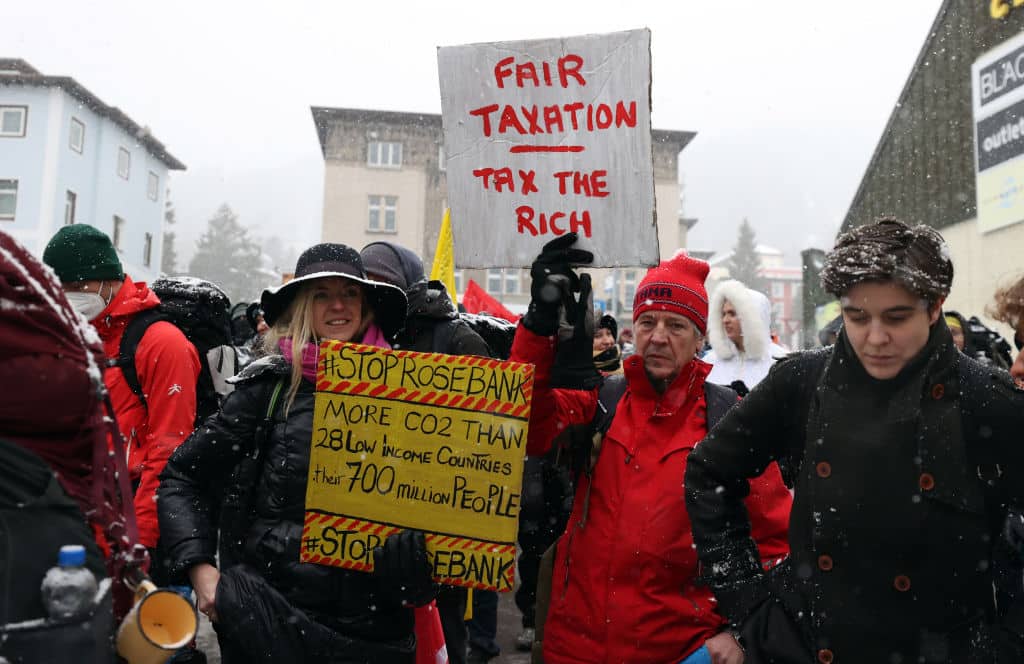Topline:
As the 2023 annual meeting of the World Economic Forum (WEF) for global business and political leaders in Davos, the Swiss alpine resort, continues, activists from the global organization, Fight Inequality Alliance, have released a statement calling for governments to “tax the rich”.
Key Facts
A report released by Fight Inequality Alliance, the Institute for Policy Studies, Oxfam and Patriotic Millionaires, reveals national wealth taxes on the richest people in 60 countries could raise $1.7 trillion in revenue.
“Activists protesting this week are asking a simple and pointed question of their governments – why won’t you tax the rich?” asks Jenny Ricks, Global Convenor of Fight Inequality Alliance, in a statement. “People are facing deepening crises from the cost of living to a lack of decent work, the impacts of the climate emergency to underfunded public services teetering on the brink, whilst the richest get richer.”
The figures in the report show that the $1.7 trillion could have been raised by wealth taxes on the ultra-rich in 2022 alone and used to tackle inequality in 60 countries across the world.
According to the Fight Inequality Alliance report, over the last decade, the inequality divide has grown sharply as a total number of people in the world with at least $5 million in net wealth has grown by 53% while ‘individuals with a net wealth of $50 million or more, have enjoyed similar growth levels’.
Loading...
“Meanwhile, the global billionaire class has more than doubled and their wealth has skyrocketed at a similar rate – 99.6%,” read the statement. “This is a gain of more than $5.9 trillion – almost twice as much as the combined GDP of Africa – a continent with over 1.3 billion people.”
The sentiment for a call to tax the rich is reasonable, but is it realistic?
Don Griswold, a progressive tax and economic policy analyst, lawyer, columnist, and anticorruption activist, tells FORBES AFRICA why this ask may be difficult for governments to respond to.
“The super-rich globally are avoiding and evading massive amounts of all kinds of tax and have been for years now. And that is the cause of just massive problems globally. It’s undermining democracy everywhere.”
According to The Washington Post, governments around the world lose about $427 billion each year to tax avoidance and evasion, and this is having a ripple effect on other issues like the climate crisis.
Climate inaction
Since the start of WEF on Monday, Davos has seen activists staging protests against a number of issues. Some 1,500 business leaders, including global energy firms are in attendance, which has led to a majority of the protests in Davos centering around the climate crisis as activists demand stronger action.
However, this “horrific problem”, as Griswold says, of tax avoidance and tax evasion has misdirected the focus of world leaders.
“It’s a horrific problem, not only for the massive redirection of government resources into private pockets, or rather keeping those resources in private pockets when they belong to the people. But it’s also having a bigger ripple effect in terms of creating completely appropriate distrust of the system by everyone else. And misdirecting resources away from achieving climate resilience and the rest of the global goals, the UN Sustainable Development Goals [that we have].”
The climate crisis has attracted its fair share of news on the African continent, which hosted the COP27 conference late last year.
Julia Fish, South African climate activist and climate finance campaigner of Fund our Future, tells FORBES AFRICA that before taxing the rich can become a reality, governments would need to get their own houses in order first.
“Promises were made at the 2009 COP conference in Copenhagen to channel $100 billion a year to emerging nations to help them adapt and mitigate against climate change by 2020,” Fish says. “This figure has fallen significantly short year-on-year. Agreements on how to distribute the money or who can draw on it are also still unclear.”
Fish further says that trust is in “short supply” for countries as those responsible for the crisis are meant to keep up with their commitments while the “least responsible are on the frontlines already dealing with catastrophic climate change”.
“The effective tax on the world’s richest nations has been missing in action, never mind a tax on their largest political campaign contributors who will pay their way out of a tax instead of paying their fair share,” Fish says.
Examples of how much national wealth taxes could raise in Africa:
(Source: Fight Inequality Alliance)
In Kenya, a wealth tax of 2% on the millionaires and 3% on those with wealth above $50 million would raise $730 million annually.
In South Africa, a wealth tax of 2% on millionaires with wealth over $5 million, 3% on those with wealth above $50 million, and 5% on South African billionaires would raise $4.9 billion annually.
Interesting Fact
South African President, Cyril Ramaphosa, was scheduled to travel to Davos for the WEF summit but cancelled his visit to Switzerland to urgently attend to the country’s energy crisis, as South Africa faces multiple stages of rolling blackouts and looming hikes in electricity tariffs.
Loading...
